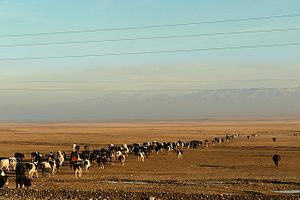After a pair of anthrax outbreaks in Kazakhstan, Kyrgyzstan has tightened veterinary controls on the border. Although both countries are members of the Eurasian Economic Union–on paper a single economic market covering Russia, Kazakhstan, Belarus, Armenia and Kyrgyzstan and encompassing 183 million people–this is also the latest episode in the back and forth imposition of border controls between the two states.
On June 22, the deputy governor of Kazakhstan’s vast central Karaganda region, Shagurashid Mamalinov, confirmed that the deaths of two villages had indeed been caused by eating beef infected with Bacillus anthracis–the bacteria that causes anthrax. As RFE/RL reported, Mamalinov said tests had confirmed that beef being sold in the village of Erkindik tested positive for Bacillus anthracis. Six other villagers were hospitalized.
A few days later, Kazakh officials confirmed a second outbreak–this one in the East Kazakhstan region. Seven people were taken to the hospital in Karaganda, according to Kazakh Health Minister Tamara Duisenova.
According to the U.S. Center for Disease Control and Prevention (CDC), “Domestic and wild animals such as cattle, sheep, goats, antelope, and deer can become infected when they breathe in or ingest spores in contaminated soil, plants, or water.” A vaccine was first developed in 1881 by Louis Pasteur in response to outbreaks among French livestock, and human vaccines developed but the Soviet Union in the late 1930s and the United States in the 1950s. “Anthrax is more common,” the CDC says, “in developing countries and countries that do not have veterinary public health programs that routinely vaccinate animals against anthrax.”
In response to these two outbreaks, Kyrgyzstan decided to tighten border controls. 24.kg reported that the press service of the State Inspectorate for Veterinary and Phytosanitary Safety had “sent to the Economic Commission of EEU the letter urging to prevent the spread of meat and dairy products from infected animals on the territory of the union.”
In May, Kazakhstan temporarily banned the import of Kyrgyz potatoes after 79 cases of golden nematode infections.
This issue of meat and dairy trade between Kazakhstan and Kyrgyzstan has been a part of the conversation regarding the latter’s entry into the EEU. In August 2015, when Kyrgyzstan joined the EEU, 24.kg reported that Saktash Khasenov, chairman of the Kazakh ministry of agriculture’s veterinary control and supervision committee, said that Kazakhstan opposed removing veterinary controls at that time, as Kyrgyzstan was not ready to “ensure an appropriate level of security.” Khasenov apparently cited concerns about foot and mouth disease, which is not present in Kazakhstan but is in Kyrgyzstan, as a reason for not lifting controls.
Should Kyrgyzstan be offended? Not really. While joining the EEU has relaxed customs controls across the union, making life perhaps a little easier for Kyrgyz migrant workers and tourists, sanitary and veterinary controls remain in place beyond the Kazakh-Kyrgyz border. In fact, borders and trade across them, which the union is meant to simplify, are still difficult.
Up to this point, many of the restrictions on the Kazakh-Kyrgyz border, with regard to the transport and trade of meat and dairy products, have come from the Kazakh side. Kyrgyzstan’s entry into the EEU–a delayed affair–hasn’t quite yielded the immediate benefits many hoped. But as Kyrgyz President Almazbek Atambayev said, “there is no alternative to the union.”
It’s likely that in a few weeks, after the Kazakhs have investigated more (and barring further outbreaks), the Kyrgyz will relax the restriction again as the two countries continue to move, haltingly, toward the envisioned single market dream that is the EEU.
































